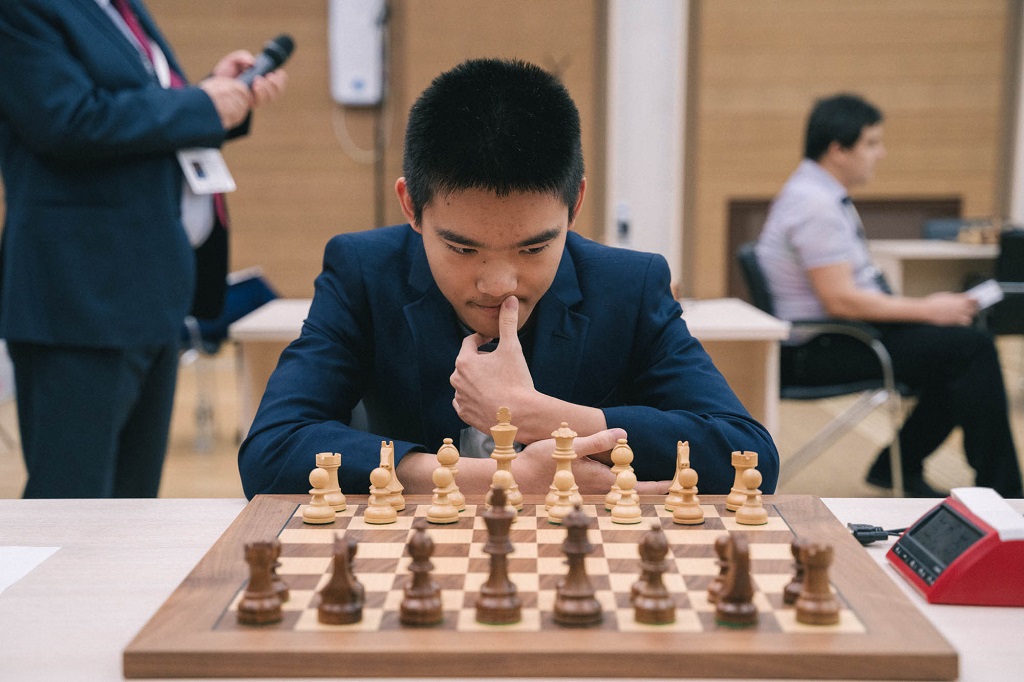


ChessBase 17 - Mega package - Edition 2024
It is the program of choice for anyone who loves the game and wants to know more about it. Start your personal success story with ChessBase and enjoy the game even more.
 The FIDE World Cup is taking place in Khanty-Mansiysk. It is a seven-round knock-out event for 128 players, with a total prize fund of US$ 1.6 million and a first prize of US$ 110,000. The matches consist of two classical games with a time control of 90 minutes for 40 moves plus 30 minutes for the rest of the game, with an increment of 30 seconds per move. The finals consist of four classical games. Full schedule.
The FIDE World Cup is taking place in Khanty-Mansiysk. It is a seven-round knock-out event for 128 players, with a total prize fund of US$ 1.6 million and a first prize of US$ 110,000. The matches consist of two classical games with a time control of 90 minutes for 40 moves plus 30 minutes for the rest of the game, with an increment of 30 seconds per move. The finals consist of four classical games. Full schedule.
The tiebreaks of round three at the FIDE World Cup saw four of the rating favourites dispatching their rivals in the first pair of rapid encounters, as Ding Liren, Yu Yangyi and Peter Svidler qualified to the next stage after a short day at the office. Nevertheless, there was plenty of excitement in store for the spectators, as three match-ups were only decided in the blitz phase.
It was in the second couple of rapid games that the upsets took place: Jeffery Xiong showed fearless chess to eliminate second seed Anish Giri, while Le Quang Liem got the sole win of his match-up against Vladislav Artemiev. Both players will be facing higher-rated opponents who are yet to play a rapid game in Khanty Mansiysk — Xiong is paired up against Jan-Krzysztof Duda, while Le will be facing Levon Aronian.
The remaining three duels were decided in the blitz phase, with the rating favourites getting the better of their opponents in all cases. Maxime Vachier-Lagrave defeated Dmitry Jakovenko despite showing some shaky chess; Ian Nepomniachtchi scored a 2:0 win in blitz over current Russian champion Evgeny Tomashevsky; and Leinier Dominguez beat Wang Hao after having bounced back from losses in both rapid phases.
Ten out of sixteen players in round four were the rating favourites in their section of the bracket, with three out of eight match-ups corresponding perfectly to the pre-tournament seeding — Alexander Grischuk v Leinier Dominguez, Ian Nepomniachtchi v Yu Yangyi and Shakhriyar Mamedyarov v Teimour Radjabov.

The Ugra Chess Academy in Khanty-Mansiysk | Photo: FIDE
Three elite players still in contention showed their class in the first pair of tiebreakers.
Ding Liren is the only 2800 player in Khanty-Mansiysk, but needed to prevail in rapid play-offs to advance in rounds one and three. His 3½ out of 4 performance in this format, however, has gained him 13.2 points in the live ratings list — he is number three in the world right now, behind Vachier-Lagrave and Carlsen.
Ding's third round rival was Iranian prodigy Alireza Firouzja, who reached a drawn rook endgame with Black in the first rapid encounter:
Chess Endgames 8 - Practical Rook Endgames
Rook endings are amongst the most frequently encountered endgames there are, and so your training effort will be quickly repaid in the form of half and full points. Knowing even a few rules of thumb and key methods makes life a great deal easier and provides a guiding light even in complex positions. This DVD focuses on the important themes which are to be found in common rook endings.
Firouzja had been defending proficiently until this point, when he allowed White to invade on the queenside after 54...♜f4+. Now White can play 55.♔b5 and after 55...♚xh5 56.♖xh7+ ♚g5 57.♖b7 ♜b4+ 58.♔a6 Ding got an unstoppable passer on the a-file. Resignation came seven moves later.
In the post-game interview, Ding Liren recounted how upset Firouzja was after losing this ending. In the rematch encounter, the Iranian quickly found himself in a lost position after over-pressing against his strong opponent.
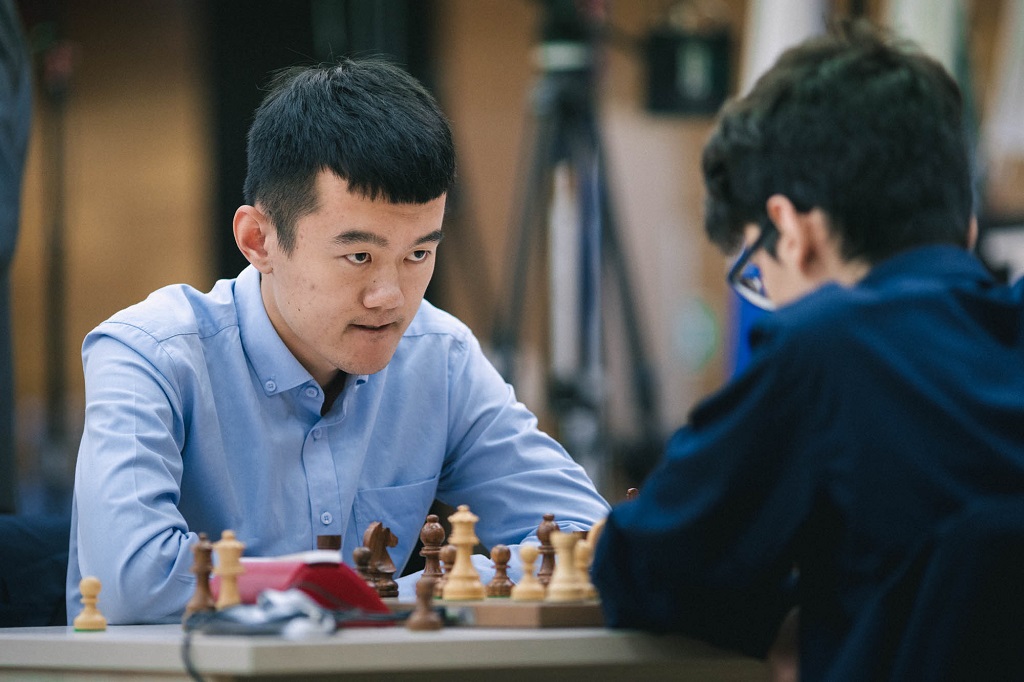
Firouzja was Ding Liren's latest victim | Photo: FIDE
Also in this phase Peter Svidler (against Liviu-Dieter Nisipeanu) and Yu Yangyi (over Wei Yi) got their tickets to next round. In the Chinese duel, 20-year-old Wei Yi was a pawn up in the second game, but he also had the weaker king:
Here White's best alternative is to capture twice on g4, while Wei Yi's 33.♖g2 gives Black a couple of tempi to decisively improve his pieces — there followed 33...♝g5 34.♕f2 (again 34.hxg4 was better) ♜e3 35.♖g3 ♛d5+ 36.♔g1 ♜xf5 and White resigned.
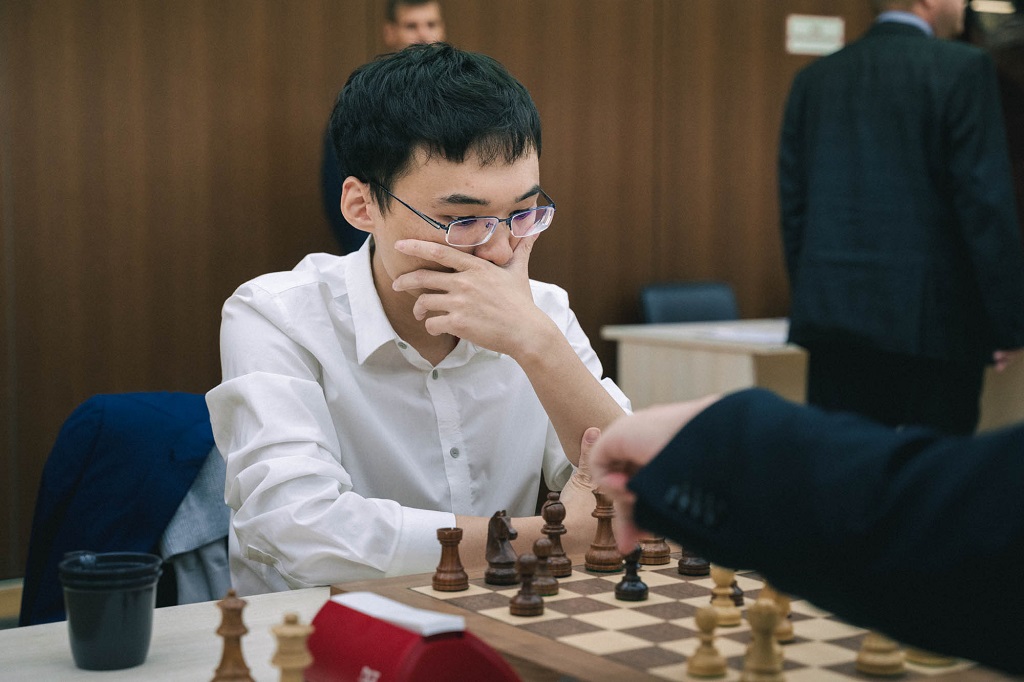
Yu Yangyi has already shown his rapid skills at this year's Norway Chess | Photo: FIDE
The highlight of the day was the battle between Anish Giri and Jeffery Xiong. The American later talked to Leontxo Garcia — who is providing commentaries in Spanish — and explained that he had purposefully gone for messy positions to counter Giri's theoretical preparation. The first 10-minute game was a perfect example of how exciting chess can be when one of the players simply goes for the sharper alternative at every bifurcation:
And Action! - How to crown positional play by tactics
There are few names which, like that of Alexei Shirov, can be associated with fantastically imaginative and tactically influenced play. Now the Latvian grandmaster is presenting a DVD on precisely that element of the game of chess. And one that is completely based on his own games.
Both kings are vulnerable to attacks, with the a-file about to open up for a black invasion. And this is just a single illustration of a fierce fight in which both contenders found astounding tactical shots and missed a number of chances — the kind of chances that are extremely hard to find without an engine running in the background. Eventually, perpetual check put an end to the game. Not all draws are dull affairs!
.jpg)
Anish Giri will have more chances to qualify to next year's Candidates | Photo: FIDE
Xiong was truth to his strategy in the next game, but this time his fearlessness was rewarded. Black had racked up the pressure on the c-file and a single blunder by Giri decided the game:
The one move that would have saved White was 25.♕h3, with the idea of responding to 25...♜xc3 26.♘xc3 ♜xc3 with 26.♕e6, going for immediate counterplay. Such moves would be difficult to calculate even in a classical game, so we cannot blame Giri for having played the losing 25.f5. Nevertheless, Xiong was merciless in the conversion of his advantage, finding tactical shots left and right until getting his ticket to the round of 16.
The US-based Vietnamese grandmaster Le Quang Liem knocked out Vladislav Artemiev in the phase of 10-minute games as well. This is Le's seventh straight World Cup, and he has never gone beyond round four, which means he has equalled his best performance in this event.
His match-up against Artemiev saw both contenders playing correct chess, neutralizing each others' ideas once and again...until the Russian miscalculated badly:
Artemiev went for 35...♜xc8, giving up his queen, counting on the strength of his passed pawns after 36.gxh5 ♜c2 37.♕b5 ♜xb2 38.♕xe5 ♜xa2:
It is remarkable that Artemiev had seen this position from afar, but in actual fact White is simply winning here — the queen is too strong. In the first diagrammed position, the plain 35...♛g6 was the way to go.
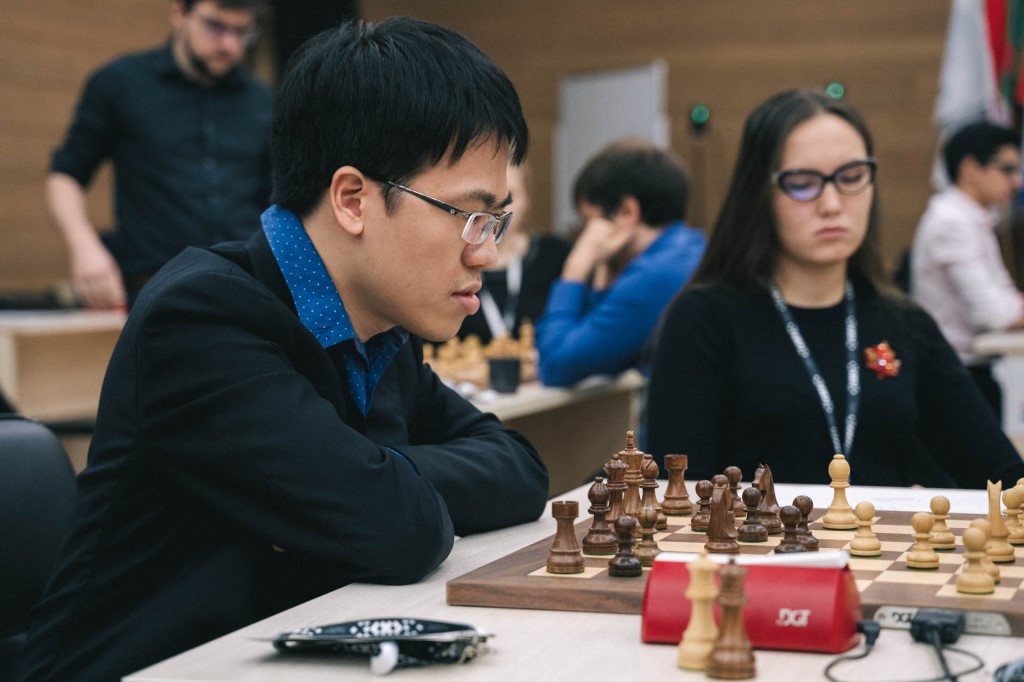
This is Le Quang Liem's seventh World Cup | Photo: FIDE
By the time a match reaches this stage, exhaustion and nervousness are the players' biggest enemies. At this point, having had faced a similar experience in the past becomes a pre-eminent factor. Thus, it is no accident that all three players that went through in the blitz are seasoned members of the elite: Ian Nepomniachtchi, Maxime Vachier-Lagrave and Leinier Dominguez.
After draws in the first four encounters of the match-up, Nepomniachtchi beat Evgeny Tomashevsky in the first 10-minute game. The current Russian champion recuperated quickly though, and proved his strength in technical positions to equal the score. But the difference in strength widened when it came to blitz — Nepomniachtchi, the fifth highest-rated player in this format, prevailed twice over his 2634-rated opponent (in blitz) in both 5-minute games.
Rocket Repertoire: The Four Knights
Like a fine wine, the Four Knights only improves with age, establishing itself as an extremely effective way of meeting 1...e5. On the outside this opening seems deceptively quiet, yet apparently natural moves can often lead to some devastating attacks.

Relieved? Worried? — Ian Nepomniachtchi | Photo: FIDE
Vachier-Lagrave, in the meantime, had been the one bouncing back from a loss, as he was defeated by Dmitry Jakoveno in their first 25-minute encounter. Much like Nepomniachtchi though, the Frenchman is a well-known blitz specialist, and he had no problem getting a big edge on the clock in the first 5-minute game to get ahead. A final 42-move draw sealed the deal for the player from Nogent-sur-Marne.
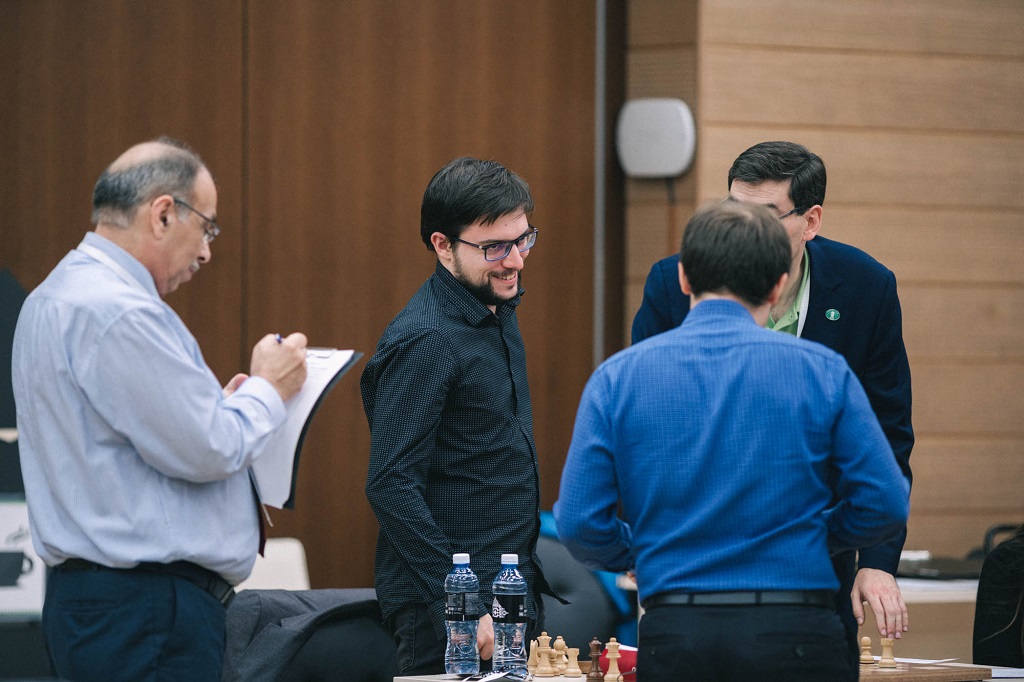
Maxime Vachier-Lagrave does not forget to have fun | Photo: FIDE
While Vachier-Lagrave had to survive a single scare against Jakovenko, Dominguez was down on the score board twice on Wednesday, as the Cuban-born grandmaster traded white wins with Wang Hao in all four rapid encounters. Dominguez got the white pieces first in the blitz though — and he used them well, grinding down his opponent from an equal rook endgame until getting a 102-move win. Wang Hao could not continue the trend and only drew with White in the eighth game of the match-up, thus getting eliminated from the competition.
The Ruy Lopez Breyer Variation
Pavel Eljanov explains in depth what Gyula Breyer already saw in 1911 and what became an opening choice of the likes of Kasparov, Kramnik, Anand or Carlsen. The Breyer Variation, which is characterised by the knight retreat to b8.
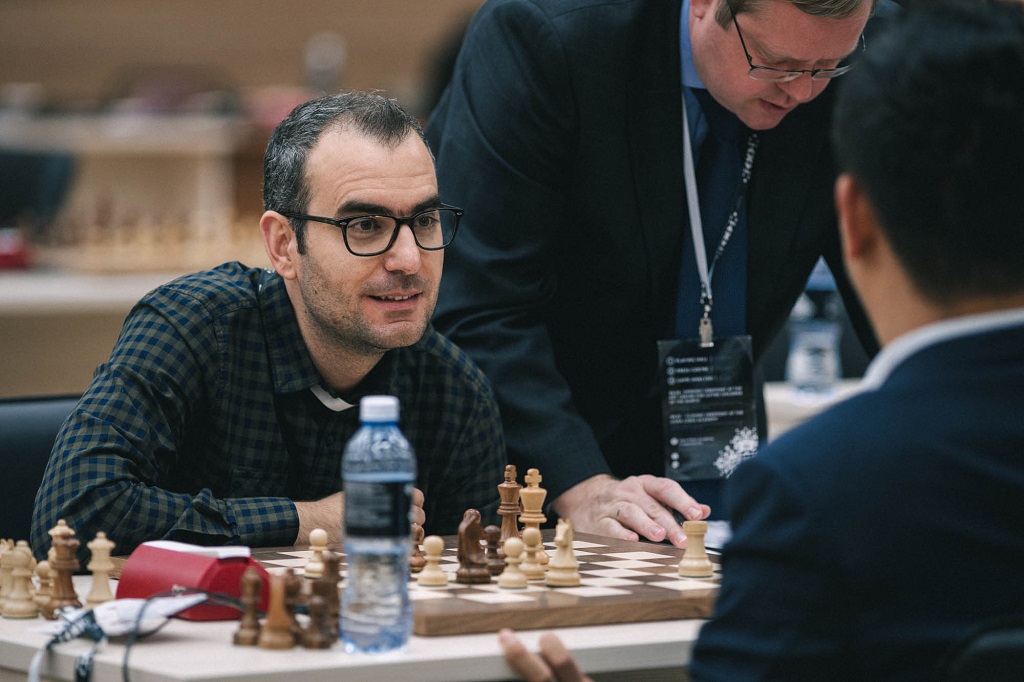
It was a roller-coaster ride for Leinier Dominguez | Photo: FIDE
Power Play 23: A Repertoire for black with the Queen's Gambit Declined
On this DVD Grandmaster Daniel King offers you a repertoire for Black with the QGD. The repertoire is demonstrated in 10 stem games, covering all White's major systems: 5 Bg5, 5 Bf4, and the Exchange Variation.
GM Danny King reviews the games of the day
Commentary by GMs Evgeny Miroshnichenko and Alex Yermolinsky